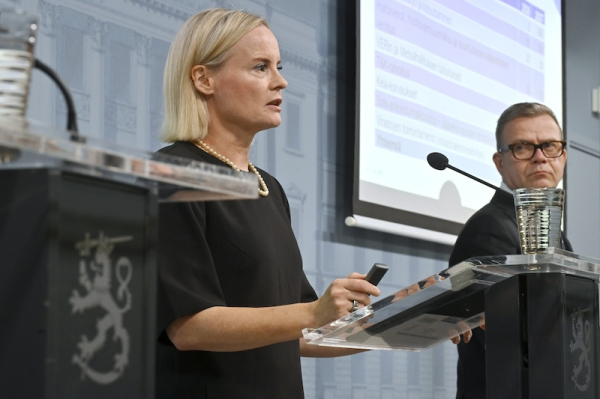Government budget talks weighed holiday cuts, overtime changes and welfare limits

Minister of Finance Riikka Purra and Prime Minister Petteri Orpo at the government’s budget session press conference in Helsinki on Tuesday evening, 2 September 2025. Photo: Markku Ulander / Lehtikuva
- Previous Article Fewer forest fire patrol flights and detections in Finland this summer
- Next Article Economic recovery slows as households cut back spending
The Finnish Ministry of Finance has published internal documents from September’s budget negotiations, showing a wide range of cost-saving ideas that were discussed but not included in the government’s final plan.
According to the material, negotiators asked officials to examine reducing Sunday and overtime pay. The proposal suggested lowering Sunday pay from double pay to 75 per cent and setting overtime bonuses at either 25 or 50 per cent.
Current law requires a 50 per cent premium for the first two hours of overtime and 100 per cent thereafter. The ministry noted that implementing such changes would depend on how they were integrated into collective agreements and warned they might make it harder to recruit staff in sectors such as healthcare.
Officials also assessed the possibility of turning Epiphany and Ascension Day into normal workdays. This would have added working hours and boosted tax revenues but, as with overtime changes, the effect would depend on collective bargaining agreements. Only about 10 per cent of workers outside agreements would have been directly affected.
Documents confirm that the government also looked at cutting fuel prices by easing biofuel blending requirements, combined with raising fuel taxes to offset lost revenue. The ministry estimated that lowering obligations to the EU minimum would reduce pump prices by only a few cents. At the same time, officials considered introducing a flight tax of €10 for domestic and short-haul flights, €40 for medium-haul, and €70 for long-haul trips. This was expected to raise €200 million in revenue but reduce passenger numbers by up to 2.8 per cent and cut tourism income by about €600 million.
Separate calculations published by the ministry show that next year’s confirmed tax changes will increase incomes for nearly all households except the lowest-earning tenth. For that group, disposable income will fall by about €25 per year. Higher earners will see the largest gains, with the top decile expected to receive an average increase of €2,164.
The changes reflect reductions in income tax and cuts to the highest marginal rates, combined with higher duties on tobacco, alcohol and soft drinks. Lower fuel taxes and adjusted income tax brackets will also raise disposable income. The removal of tax deductibility for union fees and a rise in unemployment insurance contributions will offset some of the gains.
The government also announced a series of cuts to social assistance. Students studying for a second degree who no longer qualify for student support will be required to register as unemployed jobseekers or face a 50 per cent reduction in benefits. This would oblige them to apply for and accept full-time work, even if it means interrupting their studies.
The reform would also reduce benefits for anyone who fails to apply first for other basic allowances, such as unemployment support, or who does not seek full-time work. All recipients will see a general cut of 2–3 per cent in the basic allowance. In 2024, about 3,400 full-time students received social assistance.
The government estimates that the welfare changes will strengthen public finances by €70 million by 2027 and increase employment by 1,200 people, adding €29 million to state revenues. Kela paid out €825 million in basic social assistance in 2024.
Earlier discussions on removing public holidays and reducing overtime and Sunday pay were ultimately shelved. Ministry memoranda noted limited short-term benefits and the likelihood that trade unions would seek compensation in future wage talks.
HT
- Previous Article Fewer forest fire patrol flights and detections in Finland this summer
- Next Article Economic recovery slows as households cut back spending
Source: www.helsinkitimes.fi
